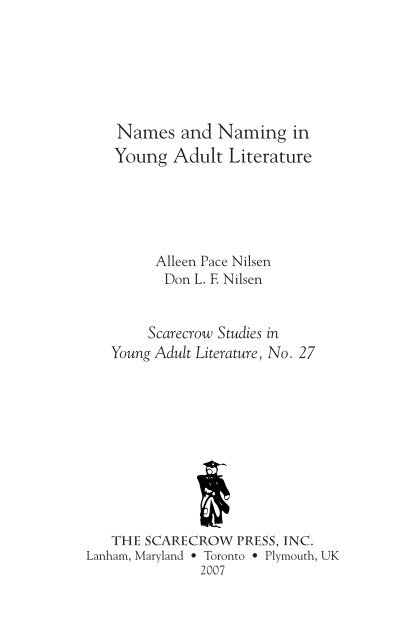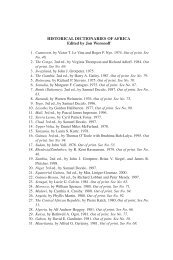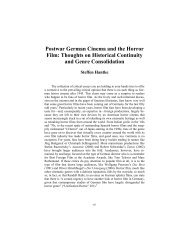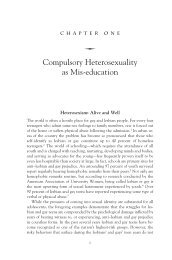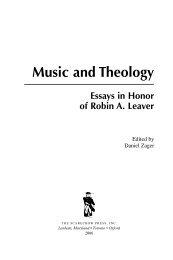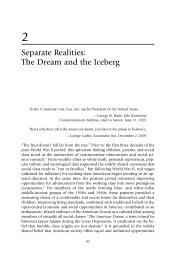Names and Naming in Young Adult Literature - Scarecrow Press
Names and Naming in Young Adult Literature - Scarecrow Press
Names and Naming in Young Adult Literature - Scarecrow Press
Create successful ePaper yourself
Turn your PDF publications into a flip-book with our unique Google optimized e-Paper software.
<strong>Names</strong> <strong>and</strong> <strong>Nam<strong>in</strong>g</strong> <strong>in</strong><br />
<strong>Young</strong> <strong>Adult</strong> <strong>Literature</strong><br />
Alleen Pace Nilsen<br />
Don L. F. Nilsen<br />
<strong>Scarecrow</strong> Studies <strong>in</strong><br />
<strong>Young</strong> <strong>Adult</strong> <strong>Literature</strong>, No. 27<br />
The <strong>Scarecrow</strong> <strong>Press</strong>, Inc.<br />
Lanham, Maryl<strong>and</strong> • Toronto • Plymouth, UK<br />
2007
Contents<br />
Introduction <strong>Names</strong> <strong>and</strong> <strong>Nam<strong>in</strong>g</strong> <strong>in</strong> <strong>Young</strong><br />
<strong>Adult</strong> <strong>Literature</strong> ix<br />
Chapter 1 <strong>Names</strong> for Fun: M. E. Kerr, Gary Paulsen,<br />
Louis Sachar, <strong>and</strong> Polly Horvath 1<br />
Chapter 2 <strong>Names</strong> to Establish Tone <strong>and</strong> Mode:<br />
Robert Cormier <strong>and</strong> Francesca Lia Block 23<br />
Chapter 3 <strong>Names</strong> to Establish Time Periods:<br />
Karen Cushman <strong>and</strong> Her Historical Fiction 47<br />
Chapter 4 <strong>Names</strong> to Establish Realistic Sett<strong>in</strong>gs:<br />
Gary Soto, Adam Rapp, Meg Rosoff, <strong>and</strong><br />
Nancy Farmer 65<br />
Chapter 5 <strong>Names</strong> to Establish Imag<strong>in</strong>ed Sett<strong>in</strong>gs:<br />
Yann Martel, Orson Scott Card, <strong>and</strong><br />
Ursula K. Le Gu<strong>in</strong> 83<br />
vii
viii Contents<br />
Chapter 6 <strong>Names</strong> to Reveal Ethnic Values: Amy Tan,<br />
S<strong>and</strong>ra Cisneros, Maya Angelou, Cynthia<br />
Kadohata, Sherman Alexie, <strong>and</strong> Others 103<br />
Chapter 7 <strong>Names</strong> to Build a Dual Audience: Daniel<br />
H<strong>and</strong>ler <strong>and</strong> the Lemony Snicket Books 123<br />
Chapter 8 <strong>Names</strong> as Memory Hooks: J. K. Rowl<strong>in</strong>g<br />
<strong>and</strong> the Harry Potter Books 141<br />
Bibliography 161<br />
Index 167<br />
About the Authors 173
Introduction: <strong>Names</strong> <strong>and</strong><br />
<strong>Nam<strong>in</strong>g</strong> <strong>in</strong> <strong>Young</strong> <strong>Adult</strong> <strong>Literature</strong><br />
Teenagers are vitally <strong>in</strong>volved <strong>in</strong> develop<strong>in</strong>g their own identities as<br />
they say good-bye to who they were as children <strong>and</strong> hello to who they<br />
will be as adults. Their names are an important part of their identities,<br />
which may be at the root of our observation that, both <strong>in</strong> real life <strong>and</strong><br />
<strong>in</strong> literature, young people are more <strong>in</strong>terested <strong>in</strong> manipulat<strong>in</strong>g <strong>and</strong><br />
present<strong>in</strong>g their names than are adults.<br />
A good example of the egocentricity of youth <strong>in</strong> relation to their<br />
own names is what an Associated <strong>Press</strong> reporter found when he went<br />
to Ernest Hem<strong>in</strong>gway’s old high school <strong>and</strong> looked through the<br />
1916–1917 yearbook. He found that Hem<strong>in</strong>gway had experimented<br />
with eight different pen names: Ernest Hem<strong>in</strong>gway, Ernest Miller Hem<strong>in</strong>gway,<br />
Ernest MacNamara Hem<strong>in</strong>gway, Ernest Monhahan Hem<strong>in</strong>gway,<br />
Ernest Hem<strong>in</strong>gway. (with a period), Ernest Michealowitch Hem<strong>in</strong>gway,<br />
B. S., <strong>and</strong> just E. H. 1 Not all teenagers are as motivated as was<br />
Hem<strong>in</strong>gway to become a famous writer, but all teenagers give considerable<br />
thought to what they want to do with their lives, not just <strong>in</strong> relation<br />
to earn<strong>in</strong>g a liv<strong>in</strong>g, but also to personal <strong>and</strong> spiritual aspects of<br />
their lives <strong>and</strong> how they want other people to relate to them.<br />
ix
x Introduction<br />
Leslie Dunkl<strong>in</strong>g, <strong>in</strong> The Gu<strong>in</strong>ness Book of <strong>Names</strong>, observes that adults<br />
change their names <strong>in</strong> relation to marriage or a desire to separate different<br />
parts of their lives, but other than <strong>in</strong> these situations when adults<br />
change their names they usually do it under a cloud. They want to hide<br />
from someone or someth<strong>in</strong>g or they want to make a new start <strong>in</strong> life. In<br />
contrast, when young adults change their names it is usually done <strong>in</strong> a<br />
celebratory mood filled with optimism <strong>and</strong> anticipation. A good illustration<br />
is near the beg<strong>in</strong>n<strong>in</strong>g of F. Scott Fitzgerald’s The Great Gatsby.<br />
James Gatz—that was really, or at least legally, his name. He had<br />
changed it at the age of seventeen <strong>and</strong> at the specific moment that witnessed<br />
the beg<strong>in</strong>n<strong>in</strong>g of his career—when he saw Dan Cody’s yacht drop<br />
anchor over the most <strong>in</strong>sidious flat on Lake Superior. It was James Gatz<br />
who had been loaf<strong>in</strong>g along the beach that afternoon <strong>in</strong> a torn green jersey<br />
<strong>and</strong> a pair of canvas pants, but it was already Jay Gatsby who borrowed<br />
a rowboat, pulled out to the Tuolumne <strong>and</strong> <strong>in</strong>formed Cody that a<br />
w<strong>in</strong>d might catch him <strong>and</strong> break him up <strong>in</strong> half an hour.<br />
I suppose he’d had the name ready for a long time, even then. (98)<br />
As you read chapters 1 through 8, we th<strong>in</strong>k you will be surprised at the<br />
variety of books we discuss <strong>and</strong> at the multitude of purposes for which the<br />
authors have <strong>in</strong>corporated names <strong>and</strong> processes of nam<strong>in</strong>g. However, we<br />
should caution that <strong>in</strong> our eagerness to demonstrate the different effects<br />
that skilled authors br<strong>in</strong>g about through their manipulation of names, we<br />
have made some arbitrary decisions. Rather than be<strong>in</strong>g comprehensive,<br />
we present a sampl<strong>in</strong>g <strong>in</strong> hopes of <strong>in</strong>spir<strong>in</strong>g readers to make their own observations.<br />
Authors capitalize on the freedom they have <strong>in</strong> creat<strong>in</strong>g<br />
names because with every other part of language they are controlled by<br />
what society has already agreed upon as the mean<strong>in</strong>gs of chosen sounds<br />
<strong>and</strong> how they should be represented. With names, authors can use all<br />
that they know about language to create totally new sound comb<strong>in</strong>ations<br />
<strong>and</strong> to clip <strong>and</strong> blend old names to be spelled <strong>and</strong> used <strong>in</strong> new ways.<br />
<strong>Names</strong> are the one part of language that gives all of us the control that<br />
Lewis Carroll’s Humpty Dumpty claimed for himself: “When I use a word<br />
it means just what I choose it to mean—neither more nor less.”<br />
As we’ve written this book, we have thought of six reasons that at<br />
least partly expla<strong>in</strong> why young adults are especially responsive to authors<br />
who are skilled <strong>in</strong> the literary uses of names—not just personal
<strong>Names</strong> <strong>and</strong> <strong>Nam<strong>in</strong>g</strong> <strong>in</strong> <strong>Young</strong> <strong>Adult</strong> <strong>Literature</strong> xi<br />
names, but also place names <strong>and</strong> names for events, <strong>in</strong>ventions, animals,<br />
attitudes, social developments, <strong>and</strong> imag<strong>in</strong>ed concepts.<br />
1. Teenagers are more <strong>in</strong>terested than are adults <strong>in</strong> manipulat<strong>in</strong>g <strong>and</strong> present<strong>in</strong>g<br />
names. Today’s generation of young people have grown up<br />
with computers <strong>and</strong> with <strong>in</strong>stant messag<strong>in</strong>g <strong>and</strong> with their own<br />
passwords <strong>and</strong> e-mail addresses. We are sometimes appalled at<br />
how much <strong>in</strong>formation our college students reveal about themselves<br />
<strong>in</strong> the few letters it takes to make an e-mail address. Now<br />
that we are advised to change our passwords every 180 days <strong>and</strong><br />
to <strong>in</strong>clude at least eight characters, more of us are gett<strong>in</strong>g practice<br />
<strong>in</strong> this k<strong>in</strong>d of creativity, but we had no need to create new<br />
“identifications” for ourselves until the 1970s when the shortlived<br />
fad of CB radios dem<strong>and</strong>ed “h<strong>and</strong>les.” Some of us have<br />
taken advantage of the opportunity to create our own license<br />
plates, but as far as we know, the art of tagg<strong>in</strong>g, which is different<br />
from graffiti, is strictly a youth activity. Accord<strong>in</strong>g to Anne W<strong>in</strong>ter,<br />
an ASU l<strong>in</strong>guist who studied tagg<strong>in</strong>g <strong>in</strong> metropolitan<br />
Phoenix, taggers try to write their tag or nickname as often <strong>and</strong><br />
as artistically as possible. Their motivation is simply to get up, to<br />
put one’s name <strong>in</strong> front of the public <strong>and</strong> to acquire fame<br />
“through frequency <strong>and</strong> volume.” 2<br />
2. Today’s media makes everyone more aware of people creat<strong>in</strong>g their<br />
own names. When Toni Morrison won the Nobel Prize, newspapers<br />
wrote “Morrison was born Chloe Anthony Wofford <strong>in</strong> the<br />
steel-mill city of Lora<strong>in</strong>, Ohio.” In other news stories, we have<br />
seen comedian Whoopi Goldberg’s birth name given as Caryn<br />
Johnson, Engelbert Humperd<strong>in</strong>ck’s as Arnold Dorsey, <strong>and</strong> Danny<br />
Kaye’s as David Daniel Kam<strong>in</strong>sky. The practice of adopt<strong>in</strong>g new<br />
<strong>and</strong> unusual names is especially common among musicians, who<br />
are some of teenagers’ most admired heroes. Virtually everyone<br />
recognizes that such names as Bo Diddley, Fats Dom<strong>in</strong>o, Beenie<br />
Man, Bono, Ice-T, Snoop Dogg, <strong>and</strong> Em<strong>in</strong>em are not “birth<br />
names.” Group names are even more creative, as with Guns N’<br />
Roses <strong>and</strong> the Sex Pistols with such aggressive performer names<br />
as Johnny Rotten <strong>and</strong> Sid Vicious. Athletes are another group<br />
whose nicknames teenagers admire, as with football players
xii Introduction<br />
Sweetness (Walter Payton), baseball players Charlie Hustle (Pete<br />
Rose) <strong>and</strong> Slamm<strong>in</strong>’ Sammy Sosa, <strong>and</strong> basketball players Magic<br />
Earv<strong>in</strong> Johnson <strong>and</strong> Sir Charles Barkley. Just as <strong>in</strong> real life where<br />
the best nicknames reflect an important aspect of personality, the<br />
most appreciated name changes <strong>in</strong> YA books are those that def<strong>in</strong>e<br />
the theme of the book, as do the titles of Christopher Paul<br />
Curtis’s Bud, Not Buddy, Jerry Sp<strong>in</strong>elli’s Maniac McGee, <strong>and</strong> Joan<br />
Bauer’s Hope Was Here.<br />
3. Teenagers are closer to the name games they played as children. L<strong>in</strong>guists<br />
tell us that young bra<strong>in</strong>s are better equipped than adult<br />
bra<strong>in</strong>s to learn language, which is one of the reasons that seven<strong>and</strong><br />
eight-year-olds love riddles <strong>and</strong> knock-knock jokes. It is also<br />
one of the reasons they create nicknames for their classmates <strong>and</strong><br />
give derogatory names to their teachers. When folklore collector<br />
Alv<strong>in</strong> Schwartz spoke at a humor conference on our campus, he<br />
made the po<strong>in</strong>t that children are basically powerless <strong>in</strong> their relationships<br />
with adults <strong>and</strong> so they seek emotional relief through<br />
name play. His observation stuck <strong>in</strong> our m<strong>in</strong>ds because we had<br />
just had an example <strong>in</strong> our family. One of our sons was <strong>in</strong> middle<br />
school <strong>and</strong> we overheard him talk<strong>in</strong>g with some friends about a<br />
teacher they called Harry. We knew he didn’t have a teacher<br />
named Harry, <strong>and</strong> when we questioned him he cheerfully expla<strong>in</strong>ed<br />
they called him Harry because his name was Dick. <strong>Adult</strong>s<br />
are more likely to get this k<strong>in</strong>d of emotional relief from shar<strong>in</strong>g<br />
anecdotes about someth<strong>in</strong>g stupid their boss did, from read<strong>in</strong>g<br />
Dilbert cartoons, or from watch<strong>in</strong>g late-night-television comedians<br />
make fun of the rich <strong>and</strong> the powerful. Because young people<br />
know that mak<strong>in</strong>g up hostile names for people is one of their<br />
techniques, Cynthia Voigt was especially effective <strong>in</strong> her negative<br />
portrayal of Tish’s abusive stepfather, Tonnie, <strong>in</strong> When She<br />
Hollers. Tonnie tries to humiliate Tish by revers<strong>in</strong>g the sounds of<br />
her name. Perceptive readers underst<strong>and</strong> from this <strong>in</strong>cident that<br />
he is not only cruel but also immature.<br />
4. People feel free to play with place names because they are not as sacred<br />
as they used to be. People are tak<strong>in</strong>g a fresh look at the names of<br />
towns <strong>and</strong> public build<strong>in</strong>gs because commercial <strong>in</strong>terests have entered<br />
the picture <strong>and</strong> nam<strong>in</strong>g rights are be<strong>in</strong>g sold for everyth<strong>in</strong>g
<strong>Names</strong> <strong>and</strong> <strong>Nam<strong>in</strong>g</strong> <strong>in</strong> <strong>Young</strong> <strong>Adult</strong> <strong>Literature</strong> xiii<br />
from colleges to sports events, <strong>and</strong> from state highways to whole<br />
towns. One of the first towns to change its name for free publicity<br />
was Hot Spr<strong>in</strong>gs, New Mexico, which <strong>in</strong> 1950 took the name of<br />
Truth or Consequences to pay the popular radio quiz show for<br />
broadcast<strong>in</strong>g from their town. More recent changes that have<br />
been <strong>in</strong> the news <strong>in</strong>clude the town of Agra, Oklahoma, which<br />
temporarily changed its name to Viagra to get free concert tickets,<br />
<strong>and</strong> the town of Halfway, Oregon, which became Half.Com for<br />
one year <strong>in</strong> exchange for money <strong>and</strong> computers. Bigger stakes are<br />
<strong>in</strong>volved when nam<strong>in</strong>g rights are sold for athletic facilities, such<br />
as here <strong>in</strong> Arizona where Bank One Ballpark, commonly called<br />
BOB, was changed to Chase Field because JPMorgan Chase &<br />
Co. purchased Bank One. Phoenicians are grateful that Chase<br />
Field at least sounds semantically connected to a sport, unlike athletic<br />
facilities <strong>in</strong> some cities that are now called Gillette Stadium,<br />
AT&T Park, <strong>and</strong> ALLTEL Stadium. Authors of books for teens<br />
are jo<strong>in</strong><strong>in</strong>g <strong>in</strong> th<strong>in</strong>k<strong>in</strong>g of new ways to get mileage out of place<br />
names. Brian Meehl’s Out of Patience is the humorous story of Jake<br />
Waters <strong>and</strong> his father’s dream of open<strong>in</strong>g the American Toilet<br />
Museum <strong>in</strong> their hometown of Patience, Kansas, while the titles<br />
of Kate Kliss’s Deliver Us from Normal <strong>and</strong> Far from Normal were<br />
<strong>in</strong>spired by the town of Normal, Ill<strong>in</strong>ois, which like many streets<br />
<strong>and</strong> some U.S. towns, was given the name because it was home to<br />
a teachers college. Such schools used to be called Normal Schools.<br />
In 2002–2003, the name Paris became popular for girls because of<br />
Paris Hilton’s TV show The Simple Life. Other place names currently<br />
be<strong>in</strong>g given to both girls <strong>and</strong> boys <strong>in</strong>clude Montana,<br />
Dakota (Cody), Camden, <strong>and</strong> Madison. Some readers were surprised<br />
to learn that John Green’s Look<strong>in</strong>g for Alaska, which won<br />
the 2006 Pr<strong>in</strong>tz Award, was not a travel adventure but the story of<br />
Miles Halter’s first year at board<strong>in</strong>g school where he comes under<br />
the spell of Alaska <strong>Young</strong>, a girl described as “clever, funny,<br />
screwed-up, <strong>and</strong> dead sexy.”<br />
5. <strong>Young</strong> adult literature is contemporary <strong>and</strong> so can reflect current<br />
trends. One of the ma<strong>in</strong> reasons that teenagers enjoy read<strong>in</strong>g<br />
YA literature, as opposed to the “classics” that are likely to be<br />
assigned <strong>in</strong> English classes, is that most of the authors are alive,
xiv Introduction<br />
<strong>and</strong> because they are astute observers of today’s society they use<br />
names <strong>in</strong> the “edgy” ways that students see <strong>in</strong> everyday life. Because<br />
today’s fashion favors creative nam<strong>in</strong>g, some names that<br />
only a few years ago were considered “weird” have risen <strong>in</strong> popularity.<br />
When the Social Security Adm<strong>in</strong>istration released its<br />
2005 list of the top one hundred names for boys <strong>and</strong> for girls,<br />
people were surprised to see that Nevaeh (Heaven spelled backwards)<br />
had worked its way <strong>in</strong>to the top one hundred for girls.<br />
Also ris<strong>in</strong>g <strong>in</strong> popularity were such spiritual names as Dest<strong>in</strong>y,<br />
Tr<strong>in</strong>ity, <strong>and</strong> Miracle. Accord<strong>in</strong>g to an article <strong>in</strong> USA Today 3 <strong>in</strong><br />
1880 more than 50 percent of U.S. male <strong>in</strong>fants were given one<br />
of the top twenty boys’ names. Today the top twenty boys’<br />
names are given to only 20 percent of male <strong>in</strong>fants. Girls have<br />
always had more variety <strong>in</strong> their names, but still <strong>in</strong> 1880, 34<br />
percent of female <strong>in</strong>fants were given one of the top twenty<br />
names. Today only 14 percent of girls will be given such common<br />
names. On websites dedicated to nam<strong>in</strong>g babies, parents<br />
are usually cautioned aga<strong>in</strong>st choos<strong>in</strong>g names for their children<br />
that will make a joke when first <strong>and</strong> last names are said together,<br />
but that doesn’t keep authors from hav<strong>in</strong>g such fun, as<br />
does Meg Rosoff <strong>in</strong> the first few pages of Just <strong>in</strong> Case, when her<br />
protagonist, David Case, changes his name to Just<strong>in</strong>. Donna Jo<br />
Napoli clipped the name of Rapunzel to get the title Zel for her<br />
retell<strong>in</strong>g of the old story. This is similar to the way that Gail<br />
Carson Lev<strong>in</strong>e clipped C<strong>in</strong>derella’s name for the title of her Ella<br />
Enchanted.<br />
6. People are choos<strong>in</strong>g names to honor, or at least h<strong>in</strong>t at, ethnic identifications.<br />
Boxer Cassius Clay was one of the first celebrities to do<br />
this when he changed his name to Mohammad Ali. When the<br />
television journalist now known as Geraldo Rivera graduated<br />
from law school <strong>and</strong> began practic<strong>in</strong>g <strong>in</strong> New York City, he used<br />
the Anglo-sound<strong>in</strong>g name of Jerry Rivers, but when he went <strong>in</strong>to<br />
show bus<strong>in</strong>ess he decided that a Lat<strong>in</strong>o identification would help<br />
him more. Akebono, the first American to w<strong>in</strong> the Japanese<br />
sumo wrestl<strong>in</strong>g championship was born Chad Rowan <strong>in</strong> Oahu,<br />
Hawaii, but he changed it to a Japanese-sound<strong>in</strong>g name to fit<br />
with the sport. More typically, many of today’s parents are giv<strong>in</strong>g
<strong>Names</strong> <strong>and</strong> <strong>Nam<strong>in</strong>g</strong> <strong>in</strong> <strong>Young</strong> <strong>Adult</strong> <strong>Literature</strong> xv<br />
their children ethnic-sound<strong>in</strong>g names as a reflection of pride <strong>in</strong><br />
their heritage. Of course when an author writes a book focused<br />
on explor<strong>in</strong>g ethnic differences, there is much more <strong>in</strong>volved<br />
than simply giv<strong>in</strong>g the characters ethnic-sound<strong>in</strong>g names. Nevertheless,<br />
it is the titles of such books as When My Name Was<br />
Keoko by L<strong>in</strong>da Sue Park, Call Me Maria by Judith Ortiz Cofer,<br />
<strong>and</strong> Miss<strong>in</strong>g Angel Juan by Francesca Lia Block that serve to let<br />
readers know that the books are go<strong>in</strong>g to have someth<strong>in</strong>g to say<br />
about particular ethnicities.<br />
In this book, we def<strong>in</strong>e young adult literature as whatever readers<br />
between the ages of twelve <strong>and</strong> eighteen choose to read for their own<br />
pleasure or enlightenment. Such read<strong>in</strong>g might be related either to<br />
school assignments or to leisure-time read<strong>in</strong>g. Also, we do not restrict<br />
our def<strong>in</strong>ition to books published by youth divisions of publish<strong>in</strong>g<br />
houses; for example, we are <strong>in</strong>clud<strong>in</strong>g books published for<br />
general adult audiences by Sherman Alexie, Maya Angelou, Orson<br />
Scott Card, S<strong>and</strong>ra Cisneros, Yann Martel, <strong>and</strong> Amy Tan, but<br />
“found” by young adults, who relate to them at least partly because<br />
of the young protagonists, but also, we th<strong>in</strong>k, because of how observant<br />
<strong>and</strong> clever these authors are <strong>in</strong> their uses of nam<strong>in</strong>g as a literary<br />
technique.<br />
We hope to encourage teachers <strong>and</strong> librarians to add names <strong>and</strong><br />
nam<strong>in</strong>g to their book discussions with young readers, but we shudder at<br />
the thought of fill-<strong>in</strong>-the-blank tests where students lose po<strong>in</strong>ts for forgett<strong>in</strong>g<br />
the names of m<strong>in</strong>or characters or misspell<strong>in</strong>g the names of major<br />
characters. We hope to <strong>in</strong>spire readers to make deeper connections<br />
<strong>and</strong> thereby ga<strong>in</strong> added pleasure from read<strong>in</strong>g many of the well-written<br />
books be<strong>in</strong>g produced for today’s young adults.<br />
In clos<strong>in</strong>g, we want to thank the late Robert Cormier, who when we<br />
<strong>in</strong>terviewed him <strong>in</strong> 1979, gave us so many <strong>in</strong>sights <strong>in</strong>to what skilled authors<br />
can do with names, that we began read<strong>in</strong>g with <strong>in</strong>creased pleasure<br />
<strong>and</strong> a new <strong>in</strong>terest <strong>in</strong> names. Without his generosity, we probably<br />
would not have thought of writ<strong>in</strong>g this book. We also want to express<br />
thanks to Arizona State University students Lisa Arter, S<strong>and</strong>ra Cr<strong>and</strong>all,<br />
Elizabeth Dern, Morgan Langhofer, <strong>and</strong> Barbara Yost, who made<br />
numerous contributions both through their knowledge <strong>and</strong> enthusiasm,
xvi Introduction<br />
<strong>and</strong> to the English Education adm<strong>in</strong>istrative assistants, Bonnie Rigmaiden<br />
<strong>and</strong> Erika L. Witt, for secretarial support.<br />
Notes<br />
1. Associated <strong>Press</strong> filler, repr<strong>in</strong>ted <strong>in</strong> Arizona Republic (May 6, 1994).<br />
2. Ann W<strong>in</strong>ter, “Graffiti as Social Discourse” <strong>in</strong> Liv<strong>in</strong>g Language edited by<br />
Alleen Pace Nilsen. Boston: Allyn & Bacon, 1999, 106–11.<br />
3. Breanne Gilpatrick <strong>and</strong> Maria Puente, “Parents resort to old trick, pick<br />
‘v<strong>in</strong>tage’ baby names.” USA Today, repr<strong>in</strong>ted <strong>in</strong> The Arizona Republic, October<br />
1, 2005.
CHAPTER ONE<br />
<br />
<strong>Names</strong> for Fun: M. E. Kerr,<br />
Gary Paulsen, Louis Sachar,<br />
<strong>and</strong> Polly Horvath<br />
While humor scholars cannot agree on exactly what will amuse people,<br />
they do agree that for someth<strong>in</strong>g to be funny there have to be elements<br />
of surprise or <strong>in</strong>congruity. Not all surprises are funny, but everyth<strong>in</strong>g<br />
that is funny conta<strong>in</strong>s someth<strong>in</strong>g that is surpris<strong>in</strong>g. The pleasure comes<br />
to people when their m<strong>in</strong>ds make a connection between two (or more)<br />
unexpected or <strong>in</strong>congruous ideas.<br />
To <strong>in</strong>troduce this chapter <strong>and</strong> to illustrate some of the current theories<br />
about what—<strong>in</strong> addition to surprise—br<strong>in</strong>gs the <strong>in</strong>tellectual pleasure<br />
of humor, we will outl<strong>in</strong>e some of the name-related features <strong>and</strong><br />
functions of humor as described by literary critics <strong>and</strong> scholars. Our illustrations<br />
come from the books of M. E. Kerr, who s<strong>in</strong>ce 1972, when<br />
she won accolades with D<strong>in</strong>ky Hocker Shoots Smack, has relied on<br />
names <strong>and</strong> nam<strong>in</strong>g practices to br<strong>in</strong>g smiles, <strong>and</strong> sometimes outright<br />
giggles, to her readers. The features <strong>and</strong> functions listed here are representative<br />
rather than comprehensive because authors are always f<strong>in</strong>d<strong>in</strong>g<br />
new ways to surprise <strong>and</strong> amuse people with names, as shown by the<br />
fuller examples presented <strong>in</strong> this chapter from books by Gary Paulsen,<br />
Louis Sachar, <strong>and</strong> Polly Horvath.<br />
1
2 Chapter One<br />
<strong>Names</strong> Express<strong>in</strong>g Hostility <strong>and</strong>/or Superiority<br />
Some humor scholars believe that for any joke or <strong>in</strong>cident to be funny<br />
it must conta<strong>in</strong> the tension that goes along with the feel<strong>in</strong>gs of hostility<br />
or superiority that are reflected <strong>in</strong> such humor-related terms as punch<br />
l<strong>in</strong>e, bit<strong>in</strong>g satire, sharp-tongued wit, a po<strong>in</strong>ted remark, a barbed joke, to<br />
crack (or break) someone up, to knock ’em dead, <strong>and</strong> to bomb. In Night<br />
Kites, when Nicki <strong>in</strong>troduces her new boyfriend, Erick Rudd, to her<br />
dad, he gr<strong>in</strong>s <strong>and</strong> says, “A new one, Fickle Pickle? Well, what’s your<br />
name? . . . Rudd?” Then he laugh<strong>in</strong>gly advises, “Don’t let her make your<br />
name Mud, Rudd” (151).<br />
In three different books (Gentleh<strong>and</strong>s, Love Is a Miss<strong>in</strong>g Person, <strong>and</strong><br />
Night Kites) Kerr makes jokes about the snobbishness of country clubs<br />
when she changes the name of the Hadefield Country Club to the<br />
Hate-Filled Club. In Gentleh<strong>and</strong>s, she illustrates the tension that exists<br />
between ord<strong>in</strong>ary townspeople <strong>and</strong> wealthy owners of seaside estates by<br />
hav<strong>in</strong>g Buddy’s father refer to Skye Penn<strong>in</strong>gton, the girl he has a crush<br />
on, as Miss Gottbucks from Beaublahblah. The Penn<strong>in</strong>gtons live on a<br />
five-acre estate named Beauregard <strong>and</strong> Buddy observes that<br />
They always seem to have names like that, don’t they? Rich, beautiful<br />
girls are never named Elsie Pip or Mary Smith. They have these special<br />
names <strong>and</strong> they say them <strong>in</strong> their particular tones <strong>and</strong> accents, <strong>and</strong> my<br />
mother was right. I was <strong>in</strong> over my head or out of my depth, or however<br />
she put it. (1)<br />
In If I Love You, Am I Trapped Forever? the protagonist is an ord<strong>in</strong>ary<br />
high school boy named Alan, who leads the attack on a new student by<br />
call<strong>in</strong>g him Doomed <strong>in</strong>stead of his real name, Duncan. But the more<br />
the girls <strong>in</strong> school get to know this <strong>in</strong>tellectual boy, who is so different<br />
from typical high school jocks, the more they like him. Alan is amazed<br />
when he hears his girlfriend refer to Doomed as Duncan. He expresses<br />
surprise <strong>and</strong> she says, “Alan, you couldn’t believe I care anyth<strong>in</strong>g about<br />
Dunc!” As Alan observes, “From Doomed to Duncan to Dunc was a<br />
long distance <strong>in</strong> a very short space of time” (135–36).<br />
In her autobiographical ME ME ME ME ME, Kerr says that the boy<br />
who <strong>in</strong>spired the character of Duncan was a Jewish refugee named Hyman<br />
G<strong>in</strong>zburg. He got off to a bad start <strong>in</strong> Auburn, New York, because
the word hyman “was never spoken unless you were talk<strong>in</strong>g privately<br />
about the wedd<strong>in</strong>g night.” He was called “Hyman the Hopeless” or just<br />
pla<strong>in</strong> “Hopeless” (14).<br />
Early <strong>in</strong> Little Little, which is a story about dwarves, Kerr uses names to<br />
establish a flip tone <strong>and</strong> to reveal the attitudes of the residents of the Tw<strong>in</strong><br />
Oaks Orphan’s Home where Sidney Applebaum, a dwarf with a humpback,<br />
grows up. He lives <strong>in</strong> Miss Lake’s—commonly called Mistake’s—<br />
cottage. Other residents <strong>in</strong>clude legless Wheels Potter, who gets around<br />
on a custom-made skateboard; Bighead Langhorn, who has a short,<br />
sk<strong>in</strong>ny body but a head the size of an enormous pumpk<strong>in</strong>; Cloud, a onearmed<br />
alb<strong>in</strong>o with a “massive head of curly white hair”; <strong>and</strong> Pill<br />
Suchanek, whose mother took a drug dur<strong>in</strong>g her pregnancy that left<br />
Pill with flippers for arms. The teacher is named Robert but the kids<br />
call him Robot because “his only facial expression was a smile, his only<br />
mood cheerful” (18–19). Miss Lake disapproves of this k<strong>in</strong>d of dark humor<br />
<strong>and</strong> implores the boys not to call Albert Cloud because “His name<br />
is Albert Werman.” Cloud <strong>in</strong>sists that he likes the name because before<br />
he came to Tw<strong>in</strong> Oaks he was “Albert Worm, or just pla<strong>in</strong> Wormy”<br />
(63). What Miss Lake does not underst<strong>and</strong> is that the boys have<br />
grabbed “nam<strong>in</strong>g rights” for themselves so as to take away the pa<strong>in</strong> that<br />
might come from outsiders call<strong>in</strong>g them names. In keep<strong>in</strong>g with their<br />
attitude, they refer to “regular” people as Sara Lee, an acronym for Similar<br />
And Regular And Like Everyone Else.<br />
<strong>Names</strong> Based on Wordplay<br />
<strong>Names</strong> for Fun 3<br />
The above examples are “softened” by wordplay, which some humor<br />
scholars say is <strong>in</strong> itself a k<strong>in</strong>d of hostility because the creators are show<strong>in</strong>g<br />
that they are superior to the language because they can do th<strong>in</strong>gs<br />
with sounds that other people have not thought of. Others say the pleasure<br />
or amusement, at least for the reader or listener—if not for the creator—comes<br />
simply from the surprise, as with the biggest midyear social<br />
event <strong>in</strong> Him She Loves? It is the Dead of W<strong>in</strong>ter Dance <strong>and</strong> even<br />
though people are to come dressed as someone dead, the music will be<br />
“Live from Iron<strong>in</strong>g Bored” (84).<br />
Kerr loves us<strong>in</strong>g repetition <strong>and</strong> alliteration <strong>in</strong> creat<strong>in</strong>g such names as<br />
Little Little, Belle La Belle, Carolyn Cardmaker, Dirtie Dotti, Buddy
4 Chapter One<br />
Boyle, <strong>and</strong> Gloria Gilman (nicknamed Gee Gee). She h<strong>in</strong>ts at the values<br />
of $uzy $lade by writ<strong>in</strong>g her name with dollar signs while she uses<br />
sarcasm <strong>in</strong> the name of Miss Gr<strong>and</strong> from Videol<strong>and</strong>. Wally Witherspoon<br />
<strong>in</strong> If I Love You, Am I Trapped Forever? has an alliterative name<br />
that encourages Wally’s “friends” to tease him about his family’s mortuary<br />
bus<strong>in</strong>ess. They call him Wither Up <strong>and</strong> Die, Wither<strong>in</strong>g Heights,<br />
<strong>and</strong> Wither-Away. In I Stay Near You, the parents of rock star Sa<strong>in</strong>t<br />
V<strong>in</strong>cent named him after their favorite poet, Edna St. V<strong>in</strong>cent Millay,<br />
while the parents of Opal R<strong>in</strong>ger apparently named her after an opal<br />
r<strong>in</strong>g.<br />
In ME ME ME ME ME, Kerr quotes from her father’s journal, “Our<br />
daughter is dat<strong>in</strong>g the local undertaker’s son, Donald Dare, tall, dark,<br />
<strong>and</strong> harmless. Dares very little is my guess” (9). This sounds almost too<br />
“polished” to have really been written <strong>in</strong> a daily journal, but it is fun to<br />
read not just because of the alliteration <strong>and</strong> the pun, but also because<br />
the name scans the same as Donald Duck.<br />
Kerr surprises <strong>and</strong> amuses her readers by creat<strong>in</strong>g character names<br />
which at first go unnoticed, but can later be used <strong>in</strong> a pun. For example<br />
<strong>in</strong> Little Little, Sydney C<strong>in</strong>namon is a catchy, alliterative name for<br />
the dwarf hero. Midway through the book when Andrea Applebaum’s<br />
mother hires Sydney to be the baby at a New Year’s Eve party, he <strong>and</strong><br />
Andrea grow romantic <strong>in</strong> the basement <strong>and</strong> Andrea croons, “C<strong>in</strong>namon<br />
<strong>and</strong> Applebaum. Put us together <strong>and</strong> we’re a pie” (101).<br />
Kerr undoubtedly named John Fell, the hero of her three mystery<br />
novels, Fell, Fell Back, <strong>and</strong> Fell Down, with an eye to such additional<br />
puns as fell apart, fell to pieces, <strong>and</strong> fell <strong>in</strong> love. When he gets hired, or<br />
more accurately bribed, to attend the Gardner School <strong>in</strong> place of a boy<br />
named Thompson P<strong>in</strong>gree, but called P<strong>in</strong>g, readers get the image of<br />
how the boy that Fell is protect<strong>in</strong>g is batted back <strong>and</strong> forth by his quarrel<strong>in</strong>g<br />
parents.<br />
<strong>Names</strong> Based on Allusions<br />
Unexpected allusions often br<strong>in</strong>g <strong>in</strong>congruous images as when <strong>in</strong> ME<br />
ME ME ME ME, Kerr names the dormitories at her old school Little<br />
Dorrit, David Copperfield, Hard Times, <strong>and</strong> Great Expectations. This<br />
was partly to honor Charles Dickens, whose skill with names she has
long admired, but also to provide fodder for clever punn<strong>in</strong>g. In D<strong>in</strong>ky<br />
Hocker Shoots Smack, the cat, which was found under a car, is named<br />
Nader <strong>in</strong> honor of Ralph Nader, who as a critic of the American automobile<br />
<strong>in</strong>dustry has also spent considerable time under cars.<br />
In ME ME ME ME ME, the second story is entitled “Where Are<br />
You Now, William Shakespeare?” It is about Marijane’s childhood “romance”<br />
with a ten-year-old neighbor named William Shakespeare, but<br />
called Billy for short. They both agree that if they ever marry <strong>and</strong> have<br />
a son they will name him Ellis (after her father) rather than William.<br />
Billy <strong>in</strong>sists that this is not because William Shakespeare is a funny<br />
name; “It’s just that there’s a famous writer with the same name” (36).<br />
In Night Kites, Erick has a crush on Nicki, whose father, Capta<strong>in</strong><br />
Marr (as <strong>in</strong> such sea-related words as mar<strong>in</strong>e, maritime, mar<strong>in</strong>a, <strong>and</strong> mar<strong>in</strong>ara<br />
sauce) runs the K<strong>in</strong>gdom by the Sea motel, which is a “tacky,<br />
shabby, shitty, go<strong>in</strong>g to rack <strong>and</strong> ru<strong>in</strong>” place, while at the same time<br />
bear<strong>in</strong>g witness to hav<strong>in</strong>g once “been a crazy, fantastic place: mysterious<br />
<strong>and</strong> silly <strong>and</strong> rare” (140–41). The suites that face the sea have<br />
Edgar Allan Poe names: Bells, Bells, Bells; The Raven; Helen; <strong>and</strong> The<br />
Black Cat. On some afternoons Nicki works at Anabel’s Resale Shop,<br />
but on other afternoons, she <strong>and</strong> Erick swim at City by the Sea or make<br />
love <strong>in</strong> Dream with<strong>in</strong> a Dream.<br />
An example of a more generalized k<strong>in</strong>d of allusion occurs <strong>in</strong> I’ll Love<br />
You When You’re More Like Me. The teenage television star Sabra St.<br />
Amour tells how her mother used to burst <strong>in</strong>to her room, turn off Elvis,<br />
<strong>and</strong> say, “What are we do<strong>in</strong>g lollygagg<strong>in</strong>g around here like Mrs. Average<br />
<strong>and</strong> her daughter, Mediocre? Let’s go to the Apple for some fun!”<br />
(115). Sabra goes on to expla<strong>in</strong> that this was way back <strong>in</strong> the “Dark<br />
Ages when Sam, Sam Superman” had them trapped <strong>in</strong> suburbia <strong>and</strong><br />
Sabra’s name was Maggie. Their glamorous new life is as different from<br />
the old as is Sabra’s new name from her orig<strong>in</strong>al name of Maggie Duggy.<br />
Ironic <strong>Names</strong><br />
<strong>Names</strong> for Fun 5<br />
When authors say one th<strong>in</strong>g while really mean<strong>in</strong>g someth<strong>in</strong>g else they<br />
are us<strong>in</strong>g irony, which forces readers to become <strong>in</strong>tellectually <strong>in</strong>volved<br />
<strong>in</strong> figur<strong>in</strong>g out the deeper, as opposed to the surface, mean<strong>in</strong>g. This is<br />
not a k<strong>in</strong>d of humor that will make people laugh out loud, but they may
6 Chapter One<br />
smile <strong>in</strong>wardly when they realize that the protagonist of D<strong>in</strong>ky Hocker<br />
Shoots Smack is anyth<strong>in</strong>g but “d<strong>in</strong>ky.” A more somber example is the title<br />
of Kerr’s Gentleh<strong>and</strong>s, which is based on the postwar hunt for one of<br />
the cruelest of the Nazi SS guards at Auschwitz, who taunted his Jewish<br />
prisoners from Rome by play<strong>in</strong>g Pucc<strong>in</strong>i’s opera Tosca <strong>and</strong> s<strong>in</strong>g<strong>in</strong>g<br />
“O dolci mani,” which translates as “gentle h<strong>and</strong>s.” The plot of the<br />
story centers around whether Buddy’s mysterious German gr<strong>and</strong>father<br />
is this man. He has named his keeshond dog Mignon, a name that he<br />
says comes from an opera, but a more gruesome <strong>in</strong>terpretation could be<br />
that it comes from filet mignon, as a rem<strong>in</strong>der of how Gentleh<strong>and</strong>s used<br />
to turn selected prisoners over to his dogs.<br />
Another solemn example of irony occurs <strong>in</strong> the book L<strong>in</strong>ger, which<br />
is about the 1992 Gulf War. In it, the soldier who was so beautiful that<br />
he was called Movie Star comes home from the war with his face practically<br />
blown away by “friendly fire,” mean<strong>in</strong>g that he was accidentally<br />
shot by soldiers on his own team. The term is so ironic that the military<br />
no longer uses it for such accidental <strong>in</strong>juries.<br />
<strong>Names</strong> to Reveal Social Class <strong>and</strong> Attitudes<br />
Is That You, Miss Blue? is set <strong>in</strong> a southern board<strong>in</strong>g school for young<br />
women. While most of the girls come from old, well-established families,<br />
a couple of them come from families that are newly affluent due to<br />
the discovery of oil on their l<strong>and</strong>. Rather than go<strong>in</strong>g <strong>in</strong>to a long, sociological<br />
description of the many differences this entails, Kerr puts<br />
across the idea by stat<strong>in</strong>g that Carolyn Cardmaker’s roommate is named<br />
Cute Diblee, “<strong>and</strong> Cute isn’t a nickname either. She’s got a sister called<br />
Sweet” (33).<br />
In the same book, one of the teachers, Ernest<strong>in</strong>e Blue, is unusually<br />
religious. When Miss Blue puts a crucifixion pa<strong>in</strong>t<strong>in</strong>g <strong>in</strong> the bathroom,<br />
the girls ridicule her by devis<strong>in</strong>g such nicknames as O Torn Cheeks,<br />
Thorn-Bra<strong>in</strong>, <strong>and</strong> O F<strong>in</strong>gers-Nailed. Fl<strong>and</strong>ers Brown, the protagonist of<br />
the story, is amazed when one of the other teachers tells her that she<br />
had gone to school with Ernest<strong>in</strong>e Blue, who had been called Nesty <strong>and</strong><br />
was chased by all the boys. Miss Blue teaches chemistry <strong>and</strong> reveals<br />
someth<strong>in</strong>g about her own attitudes when she teaches the girls about<br />
snob gases, those “that refuse to comb<strong>in</strong>e with anyth<strong>in</strong>g else under any
<strong>Names</strong> for Fun 7<br />
conditions.” She expla<strong>in</strong>s to the class that even though Cavendish, the<br />
discoverer of such gases as argon <strong>and</strong> neon, called them “noble gases because<br />
of their elite quality, she preferred to th<strong>in</strong>k of them as the snobs”<br />
(121).<br />
In Little Little, Larry La Belle leaves little doubt about what he th<strong>in</strong>ks<br />
of Little Little’s two boyfriends. He calls the one who has a hunchback<br />
<strong>and</strong> makes extra money as the mascot for a pest control company the<br />
Roach. He refers to the other one, who is already known as Opportunity<br />
Knox because of the way he uses his dwarfism to attract followers<br />
to his fledg<strong>in</strong>g church, Mr. Clean or Mr. White Suit.<br />
In Gentleh<strong>and</strong>s, Buddy is surprised that one of Skye’s wealthy friends<br />
who is named Conrad goes by Connie. In Buddy’s crowd no selfrespect<strong>in</strong>g<br />
boy would have allowed himself to be called Connie. Later<br />
<strong>in</strong> the book, Skye tells Buddy that Connie Spreckles has a new Connie.<br />
When Buddy looks puzzled, she expla<strong>in</strong>s that he has a new L<strong>in</strong>coln<br />
Cont<strong>in</strong>ental, which everybody calls Connies. This patroniz<strong>in</strong>g scene<br />
appears near the end of the book <strong>and</strong> communicates to readers that<br />
Skye <strong>and</strong> Buddy are close to the end of their summer romance.<br />
Humorous <strong>Names</strong> to Balance Serious Issues<br />
Kerr’s 1986 Night Kites is one of the earliest books to be written about<br />
a family’s experience with AIDS. When their oldest son, Pete, comes<br />
home to die from the disease, Kerr counterbalances the basic sadness of<br />
the situation with names that make readers smile. For as long as Erick,<br />
the younger brother who tells the story, can remember, there has been<br />
tension between Pete <strong>and</strong> the boys’ father. Pete used to call him O Infallible,<br />
but the younger Erick, who did not know the word <strong>in</strong>fallible,<br />
sensed only the hostility <strong>and</strong> <strong>in</strong>terpreted the name as “O Full of Bull.”<br />
Another bit of family history relat<strong>in</strong>g to Pete is that at age thirteen<br />
he knew he was gay <strong>and</strong> named his dog Oscar as a secret memorial to<br />
Oscar Wilde. The family’s m<strong>in</strong>ister, Reverend Shorr, tries to be helpful<br />
dur<strong>in</strong>g this difficult period, but the Rudd family still refers to him as<br />
Reverend Snore because he always reads his sermons, which sound like<br />
“<strong>in</strong>structions for assembl<strong>in</strong>g mail-order items” (126).<br />
Among Kerr’s best-known books is her 1994 Deliver Us from Evie, a<br />
story told by Parr Burrman, the younger brother of Evie, who is a gay
8 Chapter One<br />
senior <strong>in</strong> the small farm<strong>in</strong>g community of Duffton. The title comes from<br />
a hostile use of Evie’s name when at church the Lord’s Prayer is be<strong>in</strong>g recited<br />
<strong>and</strong> a boy says “<strong>in</strong> this loud voice, ‘Deliver us from Evie,’” after<br />
which he nudges Evie <strong>and</strong> laughs as if he has made a good joke (91). The<br />
boy is named Cord Whittle, an appropriate name for a boy who wants to<br />
tie Evie down to the farm <strong>and</strong> perhaps at the same time whittle Patsy Duff<br />
down to size. Patsy is Evie’s best friend as well as the daughter of the richest<br />
family <strong>in</strong> Duffton. A gold sign <strong>in</strong> front of their farm reads “Duffarm,”<br />
while everyone knows that the Duffs paid for the Duffton Municipal<br />
Swimm<strong>in</strong>g Pool as well as the Duffton Community Center <strong>and</strong> the Veterans<br />
Memorial Statue. Playful names that lighten the tension of the story<br />
<strong>in</strong>clude that of Angel Kidder, who is a religious but fickle girl whom Parr<br />
has a crush on. The town sheriff has the last name of Starr, while his<br />
freckle-faced son is called Spots. When Evie’s brother br<strong>in</strong>gs a girlfriend<br />
named Bella Hanna home from college, she turns out to be a vegetarian<br />
who turns up her nose at most of the th<strong>in</strong>gs about their farm. Evie <strong>and</strong><br />
Parr get even by referr<strong>in</strong>g to her as Anna Banana.<br />
The Humor of Commercial <strong>Names</strong><br />
Teenagers are so often the targets of commercial advertis<strong>in</strong>g whether <strong>in</strong><br />
their magaz<strong>in</strong>es, on television, or through “cookies” <strong>and</strong> “pop-up ads”<br />
on computer screens, that <strong>in</strong> their own defense they develop a veneer<br />
of cynicism about commercial messages. This means that they are especially<br />
appreciative of authors who make fun of advertisers’ techniques.<br />
A common trick is to create product names that drop h<strong>in</strong>ts <strong>in</strong>stead<br />
of mak<strong>in</strong>g the k<strong>in</strong>d of forthright claims that could be argued<br />
aga<strong>in</strong>st. Kerr po<strong>in</strong>ts this out when Wally first meets Sabra St. Amour<br />
on the beach <strong>in</strong> an early scene from I’ll Love You When You’re More Like<br />
Me. She asks him for a cigarette, <strong>and</strong> he tells her that she would have<br />
to be a little crazy to let the tobacco companies manipulate her with<br />
such names as Merit, which is supposed to mean someth<strong>in</strong>g like excellence,<br />
or value, or a reward. He can’t see anyth<strong>in</strong>g excellent, valuable,<br />
or reward<strong>in</strong>g about hav<strong>in</strong>g cancer. Sabra tells him she came to the<br />
beach for a swim <strong>and</strong> some sun, not for a lecture, but he goes on to ask<br />
her about the appropriateness of Vantage (clipped from advantage) as<br />
a br<strong>and</strong> name <strong>and</strong> whether True, More, <strong>and</strong> Now mean that you will
<strong>Names</strong> for Fun 9<br />
get more out of life by liv<strong>in</strong>g for the moment because you won’t live<br />
long if you are be<strong>in</strong>g True to your filthy habit. Sabra doesn’t quit smok<strong>in</strong>g,<br />
but she does start to get <strong>in</strong>terested <strong>in</strong> Wally as a th<strong>in</strong>ker. In another<br />
acknowledgment of the power of commercial names, <strong>in</strong> What I Really<br />
Th<strong>in</strong>k of You, Opal’s overweight mother is constantly eat<strong>in</strong>g Good &<br />
Plenty licorice c<strong>and</strong>y while <strong>in</strong>sist<strong>in</strong>g that she doesn’t “care one way or<br />
the other”; she just likes the name (170).<br />
In Fell when John is work<strong>in</strong>g at the Pla<strong>in</strong> <strong>and</strong> Fancy gourmet shop,<br />
one morn<strong>in</strong>g he forgets to put the rais<strong>in</strong>s <strong>in</strong> their famous White Rais<strong>in</strong><br />
Dream Cakes. Quick th<strong>in</strong>ker that he is, he capitalizes on his forgetfulness<br />
by frost<strong>in</strong>g <strong>and</strong> renam<strong>in</strong>g them “Remember<strong>in</strong>g Helen” <strong>in</strong> honor of<br />
his girlfriend, Keats, whose real name is Helen J. Keat<strong>in</strong>g. “What the<br />
hell does that mean?” barks the owner. Fell patiently expla<strong>in</strong>s that people<br />
like k<strong>in</strong>ky names <strong>and</strong> the cakes are sell<strong>in</strong>g well. Then he suggests<br />
that they rename the Black Walnut Cake “Smiles We Left Beh<strong>in</strong>d Us.”<br />
His unimpressed boss responds with “We’re not <strong>in</strong> showbiz here”<br />
(55–56).<br />
Another mysterious name <strong>in</strong> the Fell books is the secret Sevens Club<br />
at the elite Gardner school. The name h<strong>in</strong>ts at the students’ good luck<br />
<strong>in</strong> be<strong>in</strong>g tapped for membership <strong>and</strong> the accompany<strong>in</strong>g special privileges.<br />
Only near the end of the third book do readers learn that membership<br />
is awarded to those students who, at the freshman tree-plant<strong>in</strong>g<br />
ceremony, happen to choose a seven-letter name for their tree. As examples,<br />
Kerr lists Madonna, Cormier, <strong>and</strong> Up Yours. John had named<br />
his tree Good-bye partly because he had criticized his girlfriend’s architect<br />
father for choos<strong>in</strong>g the pretentious name of Adieu for the last<br />
house he planned to build. Another reason for his choice is that <strong>in</strong><br />
com<strong>in</strong>g to Gardner disguised as Thompson P<strong>in</strong>gree, he is say<strong>in</strong>g goodbye<br />
to his old name, his old life, <strong>and</strong> his old friends.<br />
In L<strong>in</strong>ger, the Dunl<strong>in</strong>ger family is accustomed to “own<strong>in</strong>g” the<br />
restaurant bus<strong>in</strong>ess <strong>in</strong> their town. When a new little Mexican restaurant<br />
that br<strong>in</strong>gs out pitchers of sangria <strong>and</strong> lets people sit <strong>in</strong> a pretty little<br />
garden with tw<strong>in</strong>kl<strong>in</strong>g lights threatens to compete, Bobby Dunl<strong>in</strong>ger<br />
starts the rumor that the owners catch cats <strong>in</strong> the fields beh<strong>in</strong>d<br />
the canal <strong>and</strong> serve them up as part of their well-spiced Mexican food.<br />
The restaurant’s name is Mañana, but to make sure everyone gets the<br />
po<strong>in</strong>t, Bobby uses graffiti to change the name to Mañana Meow.
10 Chapter One<br />
Gary Paulsen’s How Angel Peterson Got His Name<br />
Gary Paulsen’s How Angel Peterson Got His Name is a collection of five<br />
autobiographical stories—really six, count<strong>in</strong>g the one <strong>in</strong> the foreword—about<br />
the wacky th<strong>in</strong>gs that Paulsen <strong>and</strong> his buddies experience<br />
while grow<strong>in</strong>g up <strong>in</strong> rural M<strong>in</strong>nesota. He dedicates the book to “all boys<br />
<strong>in</strong> their thirteenth year; the miracle is that we live through it.”<br />
Three of the stories, <strong>in</strong>clud<strong>in</strong>g the one that gives the book its title,<br />
revolve around names:<br />
Carl Peterson—that’s the name his mother <strong>and</strong> father gave him, but<br />
from the age of thirteen <strong>and</strong> for the rest of his life not a soul, not his wife<br />
or children or any friend has ever known him by that name.<br />
He is always called Angel.<br />
Angel Peterson, <strong>and</strong> I was there when he got his name. (1)<br />
The story is too carefully written to spoil by retell<strong>in</strong>g its thirty-four<br />
pages <strong>in</strong> just a few excerpts, so we will only say that the nam<strong>in</strong>g of Angel<br />
Peterson is where the story beg<strong>in</strong>s <strong>and</strong> where it ends. Paulsen uses<br />
the <strong>in</strong>cident as the frame on which to hang some very funny writ<strong>in</strong>g.<br />
In the second story, “The Miracle of Flight,” Paulsen <strong>in</strong>cludes as almost<br />
a sidebar an <strong>in</strong>cident tell<strong>in</strong>g how Willy Parnell got the nickname<br />
of St<strong>in</strong>ky Parnell while also break<strong>in</strong>g his right ankle <strong>and</strong> gett<strong>in</strong>g out of<br />
gym class “for the rest of the year” (41). Willy had bought a silk parachute<br />
at the Army Surplus Store. The biggest one he could afford was a<br />
freight parachute designed to carry eighty pounds of freight, “while<br />
Willy came <strong>in</strong> at a hundred <strong>and</strong> sixteen” (41). Nevertheless when he<br />
climbed to the top of the water tower <strong>and</strong> “un<strong>in</strong>tentionally <strong>in</strong>vented<br />
base jump<strong>in</strong>g,” he thought it was work<strong>in</strong>g except that “the ground<br />
seemed to be com<strong>in</strong>g up pretty fast” <strong>and</strong> then he went through the roof<br />
of the Carlsons’ chicken coop (40). “Several of the chickens <strong>and</strong> a<br />
goodly pile of chicken manure comb<strong>in</strong>ed to break Willy’s fall <strong>and</strong> keep<br />
him from kill<strong>in</strong>g himself” (41). Mrs. Carlson is quoted <strong>in</strong> the local newspaper<br />
under the headl<strong>in</strong>e “Boy Crashes Coop!” Her biggest worry is that<br />
the chickens will never lay aga<strong>in</strong> because “they have a powerful fear of<br />
hawks <strong>and</strong> they thought it was a giant hawk that came after them” (41).<br />
St<strong>in</strong>ky’s new name comes from the way the chicken manure ground <strong>in</strong>to<br />
his sk<strong>in</strong> so that it takes more than a simple shower to get rid of it.
The third story “Orvis Orvisen <strong>and</strong> the Crash <strong>and</strong> Bash” beg<strong>in</strong>s<br />
with<br />
There are boys’ names that you know will make a boy popular <strong>and</strong> successful<br />
<strong>and</strong> cool <strong>and</strong> able to talk to girls (more on this later) <strong>and</strong> will<br />
make him have a wonderful life <strong>and</strong> probably get rich <strong>and</strong> marry a cheerleader<br />
<strong>and</strong> have a hot car. . . .<br />
Cl<strong>in</strong>t is such a name, <strong>and</strong> perhaps Steve, although not necessarily<br />
Steven, <strong>and</strong> Brad, <strong>and</strong> maybe best of all Nick. You just know that somebody<br />
named Nick is go<strong>in</strong>g to get it all.<br />
And then there are the other names. (55)<br />
Paulsen mentions such names as Harvey <strong>and</strong> Sidney <strong>and</strong> Gary <strong>and</strong><br />
Wesley <strong>and</strong> empathizes with any poor boy so naïve as to st<strong>and</strong> “up <strong>in</strong> the<br />
back of a new class <strong>and</strong> say, ‘Hello, my name is Harvey Hemesvedt’—not<br />
Harv, or Sid or Wes, but the whole name, Harvey” (56). All this is by way<br />
of <strong>in</strong>troduc<strong>in</strong>g the title character <strong>in</strong> the story whose parents were “silly or<br />
addled or just pla<strong>in</strong> cruel enough to give him the first name of Orvis so<br />
he has to say, ‘Hello, my name is Orvis Orvisen.’” Paulsen says they might<br />
as well have just rubbed “him with raw liver” <strong>and</strong> thrown “him <strong>in</strong>to a pit<br />
of starv<strong>in</strong>g wolves” (56). Everyth<strong>in</strong>g that happens to Orvis <strong>in</strong> the story—<br />
<strong>and</strong> there is plenty that happens—Paulsen chalks up to the way that<br />
Orvis’s personality has been molded by hav<strong>in</strong>g been given the heavy burden<br />
of carry<strong>in</strong>g around such a name as Orvis Orvisen.<br />
In the last story, “And F<strong>in</strong>ally, Skateboards, Bungee Jump<strong>in</strong>g <strong>and</strong><br />
Other Failures” Paulsen adds a different k<strong>in</strong>d of nam<strong>in</strong>g humor when<br />
Wayne, rid<strong>in</strong>g a two-by-four with skate wheels nailed to the side, grabs<br />
onto the bumper of a car whose unsuspect<strong>in</strong>g driver is on his way to<br />
Hutch<strong>in</strong>son, seven miles away. The boys tire of wait<strong>in</strong>g for Wayne to<br />
come back <strong>and</strong> so they hitch their way back <strong>in</strong>to town <strong>and</strong> go to the<br />
drugstore for “Coke glasses filled with ice cream covered with chocolate<br />
sauce <strong>and</strong> peanuts which were called, I swear, Little Dicks.” The<br />
boys could never look at the sign<br />
LITTLE DICKS<br />
15 CENTS<br />
without break<strong>in</strong>g <strong>in</strong>to a know<strong>in</strong>g smile (100).<br />
<strong>Names</strong> for Fun 11
12 Chapter One<br />
Louis Sachar’s Holes <strong>and</strong> Small Steps<br />
Seldom has an author had so much fun with names as did Louis Sachar<br />
<strong>in</strong> Holes, which <strong>in</strong> 1999 won the Newbery Medal <strong>and</strong> <strong>in</strong> 1998 the National<br />
Book Award. The story is basically a tragedy, but Sachar’s name<br />
play keeps it from be<strong>in</strong>g grim. It is actually two stories, one historical,<br />
<strong>and</strong> one contemporary. The protagonist is Stanley Yelnats, whose surname<br />
is a backwards spell<strong>in</strong>g of his given name. The name can be<br />
traced back to the “old country” where Elya Yelnats (later to be known<br />
as the <strong>in</strong>famous “no-good-dirty-rotten-pig-steal<strong>in</strong>g-great-great-gr<strong>and</strong>father”)<br />
falls <strong>in</strong> love with the beautiful but “pot-headed” Myra.<br />
A middle-aged pig farmer named Igor Barkov has already offered<br />
Myra’s father a pig weigh<strong>in</strong>g fifty stones, but the father says he has to<br />
wait until Myra turns fifteen. Elya is heartbroken because he has noth<strong>in</strong>g<br />
to offer. Madame Zeroni, a k<strong>in</strong>dhearted fortune-teller, advises Elya<br />
that he will be better off to go to America as her son has already done,<br />
but when she sees how sad he is she gives him a runt pig “not much bigger<br />
than a rat” <strong>and</strong> advises him to carry it to the top of a nearby mounta<strong>in</strong>,<br />
<strong>and</strong> when at the top to s<strong>in</strong>g it a song that she teaches him <strong>and</strong> to<br />
let the pig dr<strong>in</strong>k from the fresh spr<strong>in</strong>gwater (30). She promises Elya<br />
that each day he will grow stronger just as the pig grows bigger, <strong>and</strong> that<br />
by the time Myra turns fifteen, he will have a competitive pig. Then<br />
she asks for just one more th<strong>in</strong>g:<br />
“Anyth<strong>in</strong>g,” said Elya.<br />
“I want you to carry me up the mounta<strong>in</strong>. I want to dr<strong>in</strong>k from the<br />
stream, <strong>and</strong> I want you to s<strong>in</strong>g the song to me.”<br />
Elya promised he would.<br />
Madame Zeroni warned that if he failed to do this, he <strong>and</strong> his descendants<br />
would be doomed for all of eternity. (31)<br />
When on her fifteenth birthday, the empty-headed Myra cannot<br />
make up her m<strong>in</strong>d about whether to marry Elya or Igor (she tells them<br />
each to choose a number between one <strong>and</strong> ten), Elya is so disgusted<br />
that he gives her the pig for a wedd<strong>in</strong>g present <strong>and</strong> goes directly to the<br />
dock where he boards a ship to America. He forgets all about promis<strong>in</strong>g<br />
Madame Zeroni that <strong>in</strong> appreciation for her giv<strong>in</strong>g him the runt<br />
piglet plus all of the advice, he will carry her up the mounta<strong>in</strong> to dr<strong>in</strong>k
<strong>Names</strong> for Fun 13<br />
from the spr<strong>in</strong>g. This is the beg<strong>in</strong>n<strong>in</strong>g of the family curse that plagues<br />
the Yelnats family, through Elya’s son, who takes the more “American”<br />
sound<strong>in</strong>g first name of Stanley, <strong>and</strong> on through his son <strong>and</strong> his son,<br />
end<strong>in</strong>g up with the Stanley Yelnats who is the protagonist of Holes.<br />
Readers meet the youngest Stanley Yelnats as he is be<strong>in</strong>g checked <strong>in</strong>to<br />
Camp Green Lake, a juvenile detention center <strong>in</strong> the middle of a Texas<br />
desert.<br />
The story is filled with ironies, start<strong>in</strong>g with the name of Camp<br />
Green Lake. The lake has been dry so long that it is now part of a barren<br />
desert <strong>and</strong> has the shape of a fry<strong>in</strong>g pan. It is filled with holes because<br />
every day each boy <strong>in</strong> the camp must dig a hole as deep <strong>and</strong> as<br />
wide as his shovel. The boys are told they are digg<strong>in</strong>g the holes to build<br />
character, but they suspect someth<strong>in</strong>g more because they are <strong>in</strong>structed<br />
to br<strong>in</strong>g anyth<strong>in</strong>g unusual that they f<strong>in</strong>d to their leaders.<br />
One of the ways the boys take out their resentment is by refus<strong>in</strong>g to<br />
address the leaders by their real names. The less awful of the two male<br />
counselors (or guards) is Mr. Pendanski, who expla<strong>in</strong>s that all the boys<br />
need to remember his name is Pen, Dance, <strong>and</strong> Key. Instead, they call<br />
him Mom. They are only borderl<strong>in</strong>e disrespectful to the other guard<br />
who wants to be addressed as Sir. In feigned <strong>in</strong>nocence they call him<br />
Mr. Sir.<br />
They seldom <strong>in</strong>teract with Warden Walker <strong>and</strong> are so terrified of her<br />
that they would not th<strong>in</strong>k of giv<strong>in</strong>g her a nickname. However, Sachar<br />
uses her family name to tie her to Trout Walker, the bully of the orig<strong>in</strong>al<br />
town of Green Lake, who <strong>in</strong> the late 1800s burns Kate Barlow’s<br />
school <strong>and</strong> kills her African American boyfriend, Onion Sam, as well<br />
as his donkey, Mary Lou. He also s<strong>in</strong>ks Onion Sam’s boat, which was<br />
named after Mary Lou, the donkey. The sheriff refuses to help because<br />
Kate Barlow will not kiss him, <strong>and</strong> so, three days after the mayhem,<br />
Kate Barlow walks <strong>in</strong>to the sheriff’s office <strong>and</strong> shoots him dead. Then,<br />
she applies a fresh coat of red lipstick <strong>and</strong> gives him the kiss he was ask<strong>in</strong>g<br />
for. S<strong>in</strong>ce that fateful day, not a drop of water has fallen on Camp<br />
Green Lake.<br />
This event is the beg<strong>in</strong>n<strong>in</strong>g of her twenty-year rampage as Kiss<strong>in</strong>’<br />
Kate, who robs stagecoaches as they cross the Texas desert. When she<br />
retires <strong>and</strong> comes back to live at Green Lake, she has been there only<br />
three months when she is awakened by someone break<strong>in</strong>g <strong>in</strong>to her
14 Chapter One<br />
cab<strong>in</strong>. She opens her eyes <strong>and</strong> sees a blurry rifle only two <strong>in</strong>ches from<br />
her nose. She smells Trout Walker’s dirty feet <strong>and</strong> sees a redheaded<br />
woman rummag<strong>in</strong>g through her cupboards <strong>and</strong> drawers <strong>and</strong> knock<strong>in</strong>g<br />
th<strong>in</strong>gs from Kate’s shelves. The woman comes to her dem<strong>and</strong><strong>in</strong>g:<br />
“Where is it?” . . .<br />
“L<strong>in</strong>da Miller?” asked Kate. “Is that you?”<br />
L<strong>in</strong>da Miller had been <strong>in</strong> the fourth grade when Kate Barlow was still<br />
a teacher. She had been a cute freckle-faced girl with beautiful red hair.<br />
Now her face was blotchy, <strong>and</strong> her hair was dirty <strong>and</strong> scraggly.<br />
“It’s L<strong>in</strong>da Walker now,” said Trout.<br />
“Oh, L<strong>in</strong>da, I’m so sorry,” said Kate.<br />
Trout jabbed her throat with the rifle. “Where’s the loot?” (121)<br />
Kiss<strong>in</strong>’ Kate does not tell Trout <strong>and</strong> L<strong>in</strong>da where the treasure is, <strong>and</strong><br />
when they force her on a walk through the desert she is bitten by one<br />
of the deadly poisonous yellow-spotted lizards <strong>and</strong> dies laugh<strong>in</strong>g because<br />
she has kept her secret. Warden Walker is the child of Trout <strong>and</strong><br />
L<strong>in</strong>da, <strong>and</strong> remembers that as a child even on Christmas she was digg<strong>in</strong>g<br />
holes <strong>in</strong> search of the miss<strong>in</strong>g treasure. She founded Camp Green<br />
Lake Detention Center ma<strong>in</strong>ly to get strong young boys like Stanley to<br />
do the digg<strong>in</strong>g.<br />
The boys <strong>in</strong> the tent to which Stanley is assigned have a variety of<br />
nicknames designed to fit their <strong>in</strong>dividual personalities. Armpit “earns”<br />
his nickname by mak<strong>in</strong>g the mistake of compla<strong>in</strong><strong>in</strong>g when the <strong>in</strong>fection<br />
<strong>and</strong> the pa<strong>in</strong> from a scorpion bite gathers <strong>in</strong> the lymph nodes under<br />
his arm. Hector Zeroni is called Zero not just as a shortened form<br />
of his name, but as an <strong>in</strong>sult<strong>in</strong>g description of what the boys th<strong>in</strong>k is <strong>in</strong><br />
his head because he is unusually quiet <strong>and</strong> does not know how to read.<br />
The “gang leader” apparently creates his own name of X-Ray as compensation<br />
for the fact that he has bad eyes. His explanation is that it is<br />
pig Lat<strong>in</strong> for his real name of Rex. Zigzag walks funny, Magnet steals<br />
th<strong>in</strong>gs, Squid is small, <strong>and</strong> Barf Bag, the boy whose smelly cot Stanley<br />
<strong>in</strong>herits, apparently threw up on a regular basis. When the book opens,<br />
Barf Bag is out of the picture because of hav<strong>in</strong>g been taken to a hospital<br />
after be<strong>in</strong>g bitten by a rattlesnake. His real name is Lewis <strong>and</strong> the<br />
callousness of the camp is shown by the fact that no one asks about<br />
him. He may have even died. Someth<strong>in</strong>g similar happens later <strong>in</strong> the
<strong>Names</strong> for Fun 15<br />
book when Zero runs away <strong>and</strong> his bed is immediately given to a newcomer.<br />
The boy is called Twitch because whenever he walks by a goodlook<strong>in</strong>g<br />
car his f<strong>in</strong>gers start twitch<strong>in</strong>g at the challenge of see<strong>in</strong>g if he<br />
can steal it. When Stanley hears someone call out to “Caveman,” he<br />
looks around to see who else has come <strong>in</strong>to the tent, <strong>and</strong> then <strong>in</strong> surprise<br />
realizes that this is his new name. Back at school where he was<br />
picked on by the bully Derrick Dunne, whose given name is the same<br />
as the surname of the famous English executioner who devised derricks<br />
from which to hang people, Stanley had felt large <strong>and</strong> awkward, so now<br />
he k<strong>in</strong>d of likes the “macho” sound of his new name.<br />
The two most important names <strong>in</strong> the story are those of Stanley Yelnats<br />
<strong>and</strong> Hector Zeroni. In the end, readers discover that Zero is a descendant<br />
of the orig<strong>in</strong>al Madame Zeroni. He is the closest to a friend<br />
that Stanley has at Camp Green Lake. Stanley had been teach<strong>in</strong>g Zero<br />
to read <strong>and</strong> Zero had been help<strong>in</strong>g Stanley dig his holes. When Zero<br />
gets so tired of be<strong>in</strong>g picked on that he runs away, Stanley decides to go<br />
after him. He f<strong>in</strong>ds Zero hid<strong>in</strong>g <strong>in</strong> the rema<strong>in</strong>s of a wrecked boat, very<br />
sick from eat<strong>in</strong>g <strong>and</strong> dr<strong>in</strong>k<strong>in</strong>g the only th<strong>in</strong>g that was available:<br />
br<strong>and</strong>ied peaches (called Sploosh) prepared 110 years ago by Kiss<strong>in</strong>’<br />
Kate <strong>and</strong> given to Onion Sam as a love gift. Stanley helps the very<br />
weak Zero to come with him <strong>in</strong> search of the Thumb of God, an unusual<br />
geographical outcropp<strong>in</strong>g that Stanley’s great-great-gr<strong>and</strong>father<br />
talked about as hav<strong>in</strong>g saved his life because of be<strong>in</strong>g home to a natural<br />
spr<strong>in</strong>g, even though it is on top of a mounta<strong>in</strong> across the desert from<br />
what is now Camp Green Lake. Stanley <strong>and</strong> Zero have a challeng<strong>in</strong>g<br />
journey, but they succeed <strong>in</strong> mak<strong>in</strong>g it to the Thumb of God, where<br />
they f<strong>in</strong>d both water to dr<strong>in</strong>k <strong>and</strong> onions to eat. Once their strength is<br />
restored they secretly climb back to Camp Green Lake to dig one more<br />
hole near where Stanley had found a lipstick tube engraved with the<br />
<strong>in</strong>itials K. B. And sure enough <strong>in</strong> the middle of the night, they f<strong>in</strong>d a<br />
suitcase with a name on the outside, which Zero recognizes as Stanley,<br />
spelled backwards. It is the long lost treasure hidden by Kiss<strong>in</strong>’ Kate after<br />
she stole it from Stanley’s Great-Great-Gr<strong>and</strong>father Yelnats.<br />
When daylight comes, the warden, Mr. Pendanski, <strong>and</strong> Mr. Sir<br />
gather around the hole but are afraid to touch Stanley <strong>and</strong> Zero because<br />
of the dreaded yellow-spotted lizards. The lizards don’t bite Stanley or<br />
Zero because they are repelled by the smell <strong>and</strong> the taste of onions, <strong>and</strong>
16 Chapter One<br />
so the story ends happily. Stanley’s father has hired a lawyer to help<br />
protect his <strong>in</strong>vention of foot deodorant, <strong>and</strong> on the side, the lawyer beg<strong>in</strong>s<br />
<strong>in</strong>vestigat<strong>in</strong>g Stanley’s assignment to Camp Green Lake. She<br />
comes to get Stanley released but has to leave because no one knows<br />
where he is. The next day she returns with the state attorney general,<br />
<strong>and</strong> <strong>in</strong> the end, Stanley <strong>and</strong> Zero each receive someth<strong>in</strong>g less than—<br />
but not a lot less than—a million dollars.<br />
In one of the greatest ironies, Camp Green Lake is “bought by a national<br />
organization dedicated to the well-be<strong>in</strong>g of young girls. In a few<br />
years, Camp Green Lake will become a Girl Scout Camp” (227). What<br />
makes this so ironic is that all through the book Mr. Sir has been sarcastically<br />
call<strong>in</strong>g the boys Girl Scouts <strong>and</strong> say<strong>in</strong>g th<strong>in</strong>gs like “You’re not<br />
<strong>in</strong> the Girl Scouts anymore,” <strong>and</strong> ask<strong>in</strong>g them, “You Girl Scouts hav<strong>in</strong>g<br />
a good time?” At the very end when the official-look<strong>in</strong>g car arrives<br />
br<strong>in</strong>g<strong>in</strong>g the attorney general <strong>and</strong> Stanley’s lawyer, he rightly observes<br />
that “It a<strong>in</strong>’t Girl Scouts sell<strong>in</strong>g cookies” (211).<br />
Another ironic name is that of Sweet Feet Liv<strong>in</strong>gston, a baseball<br />
player who specializes <strong>in</strong> steal<strong>in</strong>g bases. While Liv<strong>in</strong>gston’s “sweet feet”<br />
are talented <strong>in</strong> baseball, they smell terrible. However, <strong>in</strong> the end all is<br />
well because he becomes the spokesperson for the foot deodorant that<br />
Stanley’s father <strong>in</strong>vents on his way to figur<strong>in</strong>g out how to recycle sneakers.<br />
Because the foot deodorant smells a little like peaches, they name<br />
it Sploosh, “<strong>in</strong> honor” of Kate Barlow’s spiced peaches, which probably<br />
saved both Stanley <strong>and</strong> Zero’s lives. Another names-related irony is<br />
that when Stanley first comes upon the wrecked boat <strong>and</strong> sees the<br />
name Mary Lou, he imag<strong>in</strong>es Mary Lou as a beautiful young girl out<br />
with her lover rather than as a donkey carry<strong>in</strong>g sacks of onions. But either<br />
way, he is quite right <strong>in</strong> realiz<strong>in</strong>g that someone probably drowned<br />
on the very spot where he is likely to die of thirst.<br />
And while nobody really believes the old “joke” about the family be<strong>in</strong>g<br />
cursed because of the actions of their “no-good-dirty-rotten-pigsteal<strong>in</strong>g-great-great-gr<strong>and</strong>father,”<br />
it is <strong>in</strong>terest<strong>in</strong>g that Stanley’s father<br />
discovers the wonderful foot deodorant the very day after Stanley Yelnats,<br />
the great-great-gr<strong>and</strong>son of Elya Yelnats, carries Hector Zeroni,<br />
the great-great-great-gr<strong>and</strong>son of Madame Zeroni, to the top of a<br />
mounta<strong>in</strong> where he br<strong>in</strong>gs him water from the cool spr<strong>in</strong>g <strong>and</strong> comforts<br />
him with the old-world lullaby passed down through both families.
<strong>Names</strong> for Fun 17<br />
While Sachar’s 2006 sequel, Small Steps, is not the tour de force that<br />
Holes is, for someone study<strong>in</strong>g names it is almost as <strong>in</strong>terest<strong>in</strong>g because<br />
nearly half of the characters create new names for themselves. The<br />
story is set <strong>in</strong> Aust<strong>in</strong>, Texas, where Kaira DeLeon, formerly known as<br />
Kathy Spears, is a popular young s<strong>in</strong>ger com<strong>in</strong>g to town for a big concert.<br />
Armpit, from Camp Green Lake, is the protagonist; he has gone<br />
from digg<strong>in</strong>g holes at Camp Green Lake to digg<strong>in</strong>g holes for the Ra<strong>in</strong>creek<br />
Irrigation <strong>and</strong> L<strong>and</strong>scap<strong>in</strong>g Company while also go<strong>in</strong>g to summer<br />
school. The book opens with his digg<strong>in</strong>g a trench along the side yard of<br />
a house belong<strong>in</strong>g to a woman named Cherry Lane, who happens to be<br />
the mayor of Aust<strong>in</strong>.<br />
X-Ray is the other return<strong>in</strong>g character from Camp Green Lake. He<br />
is so proud of his nickname that he has it on his vanity license plate, a<br />
disadvantage when the police come look<strong>in</strong>g to question someone<br />
named X-Ray for sell<strong>in</strong>g counterfeit tickets to a rock concert. X-Ray<br />
meets his clients <strong>in</strong> the park<strong>in</strong>g lot of the H-E-B supermarket, which<br />
readers learn is named after the founder, Howard E. Butt, who rightly<br />
figures that few people will buy their groceries at a store called Butt’s.<br />
Armpit is hav<strong>in</strong>g a hard time gett<strong>in</strong>g away from his nickname,<br />
which people assume means that “out of all those nasty, sweaty guys [at<br />
Camp Green Lake], he smelled the worst!” (89). When Armpit makes<br />
arrangements to take Tatiana, a girl who makes his knees weak, to<br />
Kaira DeLeon’s concert, her friends say such th<strong>in</strong>gs as “He’ll probably<br />
put his big, fat, sweaty arm around you.” She changes her m<strong>in</strong>d so that<br />
at the last m<strong>in</strong>ute, Armpit <strong>in</strong>vites G<strong>in</strong>ny, a ten-year-old neighbor girl<br />
with cerebral palsy to go with him.<br />
Through some pretty unlikely circumstances, Armpit <strong>and</strong> G<strong>in</strong>ny<br />
end up watch<strong>in</strong>g the show from backstage <strong>and</strong>, after the show, hav<strong>in</strong>g<br />
ice cream with Kaira <strong>in</strong> her dress<strong>in</strong>g room. G<strong>in</strong>ny whispers to Kaira<br />
that Armpit’s name comes from some part of his body, <strong>and</strong> so Kaira<br />
teases him by call<strong>in</strong>g him Knuckles, Elbow, Muscles, Toenail, H<strong>and</strong>s,<br />
<strong>and</strong> F<strong>in</strong>gers. G<strong>in</strong>ny promises that it isn’t anyplace “nasty,” <strong>and</strong> so<br />
Armpit f<strong>in</strong>ally tells Kaira his name when she agrees that she will touch<br />
whatever it is. This turns out to be a k<strong>in</strong>d of <strong>in</strong>timate little pleasure.<br />
A funnier part is when Kaira is s<strong>in</strong>g<strong>in</strong>g one of her songs <strong>and</strong> from<br />
backstage Armpit mishears it <strong>and</strong> th<strong>in</strong>ks she is s<strong>in</strong>g<strong>in</strong>g his name <strong>in</strong>stead<br />
of “I’m but . . .” <strong>in</strong>,
18 Chapter One<br />
These shoes, these jewels, this dress.<br />
A perfect picture of success.<br />
You would never guess . . .<br />
I’m but a damsel <strong>in</strong> distress.<br />
Save me. I’m but a damsel <strong>in</strong> distress. (118)<br />
Later when they get to know each other <strong>and</strong> he asks her about the<br />
words, they have a good laugh. One night dur<strong>in</strong>g a concert she actually<br />
s<strong>in</strong>gs “Save me, Armpit! A damsel <strong>in</strong> distress.” Neither the audience<br />
nor the b<strong>and</strong> notices (196), nor does Armpit because he is still at home<br />
<strong>in</strong> Texas, gett<strong>in</strong>g ready to come <strong>and</strong> hear her s<strong>in</strong>g at her next concert<br />
<strong>in</strong> San Francisco. Sachar uses the <strong>in</strong>cident to show the high po<strong>in</strong>t of<br />
Kaira’s feel<strong>in</strong>gs toward Armpit.<br />
Polly Horvath’s The Cann<strong>in</strong>g Season<br />
Polly Horvath uses names for creat<strong>in</strong>g a fanciful tone of exaggeration <strong>in</strong><br />
The Cann<strong>in</strong>g Season, which won the 2003 National Book Award. This<br />
gr<strong>and</strong> old spoof is the story of thirteen-year-old Ratchet <strong>and</strong> fourteenyear-old<br />
Harper, who one summer beg<strong>in</strong> mak<strong>in</strong>g new lives for themselves<br />
<strong>in</strong> the bear-filled woods of coastal Ma<strong>in</strong>e. They are stay<strong>in</strong>g <strong>in</strong> the<br />
old Menuto family home now occupied by tw<strong>in</strong> sisters, Penpen <strong>and</strong><br />
Tilly, who are <strong>in</strong> their n<strong>in</strong>eties, but still make a passable liv<strong>in</strong>g by gather<strong>in</strong>g<br />
<strong>and</strong> cann<strong>in</strong>g the wild blueberries that grow on their l<strong>and</strong>.<br />
In a six-page prologue, Horvath uses two name-related <strong>in</strong>cidents,<br />
one about the Pensacola Hunt Club <strong>and</strong> the other about how Ratchet<br />
got her name, to <strong>in</strong>troduce readers to Ratchet’s mother, Henriette. She<br />
is a depressed woman who sleeps a lot <strong>in</strong> the “small, gloomy subbasement<br />
apartment” where Ratchet has grown up <strong>in</strong> Florida. Ratchet<br />
underst<strong>and</strong>s that her mother is worn out “from wait<strong>in</strong>g tables at the<br />
Hunt Club <strong>and</strong> from clean<strong>in</strong>g other people’s apartments.” For as long<br />
as Ratchet can remember, her mother has talked about the Pensacola<br />
Hunt Club “with its horses, tennis, swimm<strong>in</strong>g, <strong>and</strong> sumptuous clubhouse”<br />
as if it were Heaven on Earth (4). Ratchet is comforted by the<br />
idea of there be<strong>in</strong>g a place as wonderful as the Pensacola Hunt Club<br />
even though her mother expla<strong>in</strong>s that she could never take Ratchet to<br />
the club because of “that th<strong>in</strong>g” (an unsightly birthmark) on her shoul-
<strong>Names</strong> for Fun 19<br />
der blade, which would show if she wore a swimm<strong>in</strong>g suit. Ratchet<br />
grows up th<strong>in</strong>k<strong>in</strong>g that she is the one keep<strong>in</strong>g her mother from belong<strong>in</strong>g<br />
to the Pensacola Hunt Club. But on the next to the last page of the<br />
book, readers learn that Ratchet, who is now a middle-aged woman,<br />
has telephoned the Pensacola Hunt Club <strong>and</strong> learned that anyone can<br />
be a member. It was never up to Ratchet to get her mother accepted.<br />
Henriette was us<strong>in</strong>g the name of the Pensacola Hunt Club not to refer<br />
to the actual establishment but as a metaphor for all the th<strong>in</strong>gs <strong>in</strong> life<br />
she wants but suspects she will never have.<br />
Along with obsess<strong>in</strong>g about Ratchet’s birthmark, Henriette bemoans<br />
Ratchet’s unfashionable name—“That was your father’s fault” (5).<br />
Ratchet has never met her father because he “took a powder” shortly<br />
after Ratchet was born. Henriette tells Ratchet the story on the same<br />
day that she <strong>in</strong>forms her that she is go<strong>in</strong>g away for the summer. After<br />
giv<strong>in</strong>g birth to her first (<strong>and</strong> only) baby, she is <strong>in</strong> a foul mood because<br />
of the pa<strong>in</strong> <strong>and</strong> stress of the delivery <strong>and</strong> the fact that at the hospital<br />
she has been wheeled <strong>in</strong>to a room with seven other new mothers. Naturally,<br />
she makes a fuss: “I mean, if I wanted to hang out with a bunch<br />
of other women I would have lived <strong>in</strong> a commune, right? I would have<br />
had my labor <strong>in</strong> some touchy-feely ashram” (6).<br />
Workmen are fix<strong>in</strong>g pipes <strong>in</strong> the only available private room, but to<br />
keep Henriette from distress<strong>in</strong>g all the other new mothers, the nurses<br />
put her <strong>in</strong> with the workmen. She soon gets rid of them by throw<strong>in</strong>g<br />
around “bits of placenta” (really chunks of cherry Jell-O from her d<strong>in</strong>ner<br />
tray). They leave <strong>in</strong> such a hurry that they forget to take all their<br />
tools. At first, Henriette does not notice because she is argu<strong>in</strong>g with<br />
Ratchet’s father over what to name the baby.<br />
I liked the name Eugenie, <strong>and</strong> your father kept say<strong>in</strong>g, “STINKO. Let’s<br />
name her STINKO,” just to be funny. Can you imag<strong>in</strong>e annoy<strong>in</strong>g me after<br />
the k<strong>in</strong>d of day I’d had? Then he says, “Or how about FART? FART<br />
Clark!”<br />
I’d say Yvonne, <strong>and</strong> he’d say Belch. He just wasn’t listen<strong>in</strong>g, he was<br />
too busy be<strong>in</strong>g hilarious. That’s when I saw the tool on the w<strong>in</strong>dowsill.<br />
“Who left that ratchet on the w<strong>in</strong>dowsill?” I asked, but of course he can’t<br />
just answer the question. He has to argue. “No, it’s not a ratchet, it’s a<br />
lug wrench.” Well, I knew a ratchet when I saw one. (7)
20 Chapter One<br />
Henriette tires of the argument <strong>and</strong> so pretends to read. The father gets so<br />
mad that he starts to dump Henriette out the w<strong>in</strong>dow, but fortunately a<br />
nurse <strong>in</strong>tercedes, <strong>and</strong> then someone <strong>in</strong> the hall shouts that Havana cigars<br />
are be<strong>in</strong>g passed out <strong>in</strong> the wait<strong>in</strong>g room <strong>and</strong> Mr. Clark dashes off. Before<br />
he gets back, a woman comes <strong>in</strong> to get the <strong>in</strong>formation for the birth certificate<br />
<strong>and</strong> Henriette grabs the form <strong>and</strong> gets the last word <strong>in</strong> the argument<br />
by writ<strong>in</strong>g “Ratchet! Ratchet! <strong>in</strong> the space for the first <strong>and</strong> middle<br />
names,” <strong>and</strong> that, she concludes, is “how you became Ratchet Ratchet<br />
Clark.” Then as almost a P.S. she adds, “Oh, <strong>and</strong> by the way, you’re go<strong>in</strong>g<br />
to Ma<strong>in</strong>e tonight” to stay with Aunt Tilly <strong>and</strong> Aunt Penpen (8).<br />
Ratchet, who didn’t even know she had any relatives, is be<strong>in</strong>g sent on<br />
the tra<strong>in</strong> to spend the summer with two women who are “great-second<br />
cous<strong>in</strong>s once removed,” but for convenience are called Aunt Tilly <strong>and</strong><br />
Aunt Penpen. Ratchet’s mother expla<strong>in</strong>s that she herself had spent summers<br />
with Tilly <strong>and</strong> Penpen <strong>and</strong> she is send<strong>in</strong>g Ratchet there because<br />
she’s now old enough “to get some away-from-home experience”; plus it<br />
is the only place she can th<strong>in</strong>k of that won’t cost money (9).<br />
In a little names joke that Horvath may have been mak<strong>in</strong>g only for<br />
herself, Tilly <strong>and</strong> Penpen’s family name is Menuto, which sounds like<br />
Spanish menudo, soup made from tripe. Henriette <strong>and</strong> Ratchet are already<br />
at the tra<strong>in</strong> station when Henriette describes the tw<strong>in</strong> sisters as<br />
hav<strong>in</strong>g been already old when she spent summers with them. By now<br />
she imag<strong>in</strong>es they are “casket-ready.” Then she adds that “Penpen was<br />
k<strong>in</strong>d of fat <strong>and</strong> happy-happy all the time, <strong>and</strong> Tilly looked like a<br />
sph<strong>in</strong>cter” (10). “Like a what?” Ratchet asks, but the conductor is hurry<strong>in</strong>g<br />
her up the steps of the tra<strong>in</strong> so fast that there’s no answer.<br />
Ratchet’s ticket says Dairy, but her mother has told her that the aunts<br />
live past D<strong>in</strong>k or maybe it’s past Delta. When Ratchet is picked up at<br />
the tra<strong>in</strong> station <strong>and</strong> climbs <strong>in</strong>to the aunts’ ancient Daimler, “all these<br />
‘D’ names blurred <strong>in</strong> her m<strong>in</strong>d” (12). It hardly matters because after a<br />
tortuous trip through the dark woods they arrive at a house named Glen<br />
Rosa that isn’t close to any town, which, as they expla<strong>in</strong> to Ratchet, may<br />
turn out to be a problem because if they die (<strong>and</strong> they’ve always planned<br />
to die together), there won’t be anyone to help Ratchet.<br />
Ratchet, Penpen, <strong>and</strong> Tilly have a couple of weeks to get acqua<strong>in</strong>ted<br />
before the fourth character, Harper, appears <strong>in</strong> the book. Dur<strong>in</strong>g these<br />
weeks, Ratchet observes that Penpen is the stronger of the two women
<strong>Names</strong> for Fun 21<br />
<strong>and</strong> that Tilly dr<strong>in</strong>ks way too much. She learns how Tilly’s “brief but<br />
oddly satisfy<strong>in</strong>g marriage” had been <strong>in</strong>spired by a lumberjack’s daughter<br />
named Lilla, but who everyone called Lilla Vanilla because her sk<strong>in</strong> was<br />
so milky white. Actually, Lilla bleached her sk<strong>in</strong> “with buttermilk all<br />
summer, so that she always had a slightly sour smell” (46), which made<br />
Tilly th<strong>in</strong>k no one would want to come close to her, but actually “she<br />
was so well wanted that she was pregnant, or as we used to call it, <strong>in</strong> a<br />
pickle” (47). Her father set out to arrange a marriage <strong>and</strong> s<strong>in</strong>ce “Lilla<br />
didn’t know which of her many suitors was the father,” she chose the<br />
banker’s son because he seemed to have the most potential. Because of<br />
the pregnancy, everyth<strong>in</strong>g had to be speeded up, but still the wedd<strong>in</strong>g<br />
“was the biggest th<strong>in</strong>g to hit D<strong>in</strong>k s<strong>in</strong>ce a logger rolled his truck” (50).<br />
The gr<strong>and</strong>ness of it <strong>in</strong>spired Tilly to get engaged to Burl, a lumberjack<br />
who “was not too bright” (77). At the wedd<strong>in</strong>g ceremony, Tilly<br />
changes her m<strong>in</strong>d about marry<strong>in</strong>g Burl, giv<strong>in</strong>g as her excuse the ridiculous<br />
vow of love that he <strong>and</strong> his fellow lumberjacks have composed for<br />
the wedd<strong>in</strong>g. While Tilly becomes a runaway bride, Burl is conv<strong>in</strong>ced<br />
that they are actually married. He tries to ga<strong>in</strong> back his respectability<br />
by jo<strong>in</strong><strong>in</strong>g the Catholic Church, even though he has to go clear to<br />
Delta to f<strong>in</strong>d a priest. And later, when he actually marries Thelma, a<br />
bartender at the local tavern who still resents Tilly, he is conv<strong>in</strong>ced<br />
that their children are “born <strong>in</strong> s<strong>in</strong>.” As Tilly expla<strong>in</strong>s to Ratchet, the<br />
children would never have known that they were “illegitimate” if<br />
Thelma didn’t keep po<strong>in</strong>t<strong>in</strong>g it out to them <strong>and</strong> call<strong>in</strong>g them Technical<br />
S<strong>in</strong> One, Technical S<strong>in</strong> Two, <strong>and</strong> Technical S<strong>in</strong> Three (78).<br />
With Harper’s arrival, Horvath presents a third example of a mother<br />
be<strong>in</strong>g less than wise about the nam<strong>in</strong>g of children. Harper arrives on<br />
the front porch of Glen Rosa with an obviously pregnant Miss Madison.<br />
The pregnant woman has mistaken Glen Rosa for the St. Cyr’s Orphanage,<br />
which is more than ten miles up the road. She expla<strong>in</strong>s that<br />
Harper’s mother took off when Harper was just a baby <strong>and</strong> so she has<br />
been stuck with rais<strong>in</strong>g Harper, but now that she is go<strong>in</strong>g to have a<br />
child of her own, she’s head<strong>in</strong>g up to Canada. It was a French Canadian<br />
who got her pregnant, <strong>and</strong> she’s go<strong>in</strong>g to look for his mother, who<br />
seemed like a nice person. This is why she f<strong>in</strong>ds it necessary to br<strong>in</strong>g<br />
Harper to St. Cyr’s, where she’s heard they will accept anyone—even a<br />
big girl like Harper.
22 Chapter One<br />
The long <strong>and</strong> the short of the story is that Ratchet <strong>and</strong> Harper both<br />
end up stay<strong>in</strong>g with Tilly <strong>and</strong> Penpen, who eventually will the house to<br />
them <strong>in</strong> exchange for the promise that they will never sell it. The pregnant<br />
Miss Madison keeps popp<strong>in</strong>g back <strong>in</strong>to the picture, each time<br />
mak<strong>in</strong>g Harper th<strong>in</strong>k she is go<strong>in</strong>g to “re-adopt” her. The f<strong>in</strong>al stamp is<br />
put on the matter when for the third time Miss Madison br<strong>in</strong>gs Harper<br />
<strong>and</strong> her suitcase back to Glen Rosa, along with the new baby, who she<br />
<strong>in</strong>troduces with<br />
It’s Harpertu.<br />
Harper too? Asked Penpen,<br />
Yeah, Harpertu. H-a-r-p-e-r-t-u. I liked it. Had k<strong>in</strong>d of a foreign r<strong>in</strong>g<br />
about it. It’ll be k<strong>in</strong>d of an exotic name to take up there to French<br />
Canada. And like I said, I wanted to do someth<strong>in</strong>g k<strong>in</strong>d of to remember<br />
Harper by because if I could’ve seen a way to, I would have taken her,<br />
too. She knows that, don’t you, Harper? (154)<br />
Years later, Harper goes off to Brunswick College to become a specialist<br />
<strong>in</strong> worms <strong>and</strong> organic farm<strong>in</strong>g, while Ratchet stays at Glen Rosa<br />
mak<strong>in</strong>g it a productive farm. Harper comes back every summer to help<br />
dur<strong>in</strong>g the hectic blueberry season. By the end of the book, Ratchet has<br />
married a doctor who mistakenly comes to the house th<strong>in</strong>k<strong>in</strong>g it is the<br />
old orphanage, <strong>and</strong> Harper has married <strong>and</strong> given birth to six daughters.<br />
Three of them, <strong>in</strong>clud<strong>in</strong>g baby Tutu, Tilly, <strong>and</strong> Penny, have <strong>in</strong>herited<br />
names from earlier characters <strong>in</strong> the book. Fortunately, everyone<br />
<strong>in</strong> both families loves blueberry muff<strong>in</strong>s.


